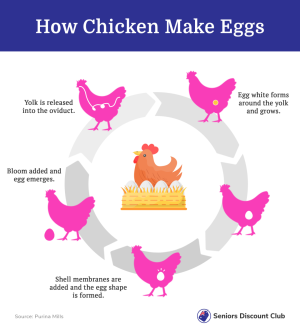Nutritionist exposes ‘misleading’ labels on supermarket egg cartons
- Replies 11
It can be overwhelming when we head down to the grocery store and look at the endless selection of eggs.
While organic and free-range eggs are often more expensive, what is the real difference between each type, and why do these price tags continually jump higher and higher?
Recently, a nutritionist took to social media to help us understand the confusion among egg cartons at the supermarket and explain why it’s so important to pay attention to the labels.
So, read on and let’s dig into the truth behind these egg labels together!

Craig McCloskey began his video by talking about the various types of eggs that are commonly available.
He started with what is known as 'conventional eggs'. These eggs are the most affordable option, but they come from chickens that are kept in battery cages. These cages are small and crowded, with typically two to ten birds living in each one, and the chickens spend their entire lives in these confined conditions.
As a consequence of their living conditions, the quality of these eggs is considered to be poor.
Moving on, he spoke about 'cage-free eggs', which come from chickens that are not kept in battery cages. However, he pointed out that being cage-free does not necessarily mean the hens have access to the outdoors.
Instead, they are confined to a relatively small indoor space. Despite being a step up from conventional eggs, they are only marginally better due to the lack of outdoor access for the chickens.
The next option is 'free-range' eggs. Here, the chickens are given access to the outdoors, and they have around two square feet of space per chicken. This offers better living conditions compared to cage-free eggs since the hens can roam outside.
However, regardless of the type of eggs, all these chickens are typically fed a diet of corn or soy. While this feed is cost-effective, it may not be the best for the birds' health or the overall quality of the eggs they produce.
At the top of the list are 'pasture-raised' eggs, considered the best conditions for chickens. These hens have 10 square metres of space each and are able to eat a natural diet of grass, bugs, and worms.
They also live in more humane conditions. And because of these superior conditions, pasture-raised eggs are considered the healthiest option and are also the most expensive.
While the difference between each label comes down to the quality of diet and living conditions, we must also consider our own financial situation. As McCloskey pointed out: conventional eggs are still a much better option than ultra-processed foods.
If pasture-raised eggs are a financial option for you, they come with a variety of health benefits. According to Piedmont, pasture-raised chickens have more vitamin E and omega-3 fatty acids, which are advantageous from a heart health and overall well-being perspective.
Comments on the post from shoppers have suggested boycotting conventional eggs and grocery store eggs altogether and only getting eggs from local farmers or avid gardeners.

Although pasture-raised chickens are the most humane and offer the best nutrition, there really is no ‘wrong’ choice when it comes to eggs.
At the end of the day, members, choose wisely the next time you’re at the supermarket. Consider the labels on the egg cartons, but also your own financial situation—and don't forget that the eggs we eat contain a great number of vitamins and minerals, regardless of where they come from.
What are your thoughts, folks? Which preferences do you consider when choosing your eggs? Let us know in the comments below!
While organic and free-range eggs are often more expensive, what is the real difference between each type, and why do these price tags continually jump higher and higher?
Recently, a nutritionist took to social media to help us understand the confusion among egg cartons at the supermarket and explain why it’s so important to pay attention to the labels.
So, read on and let’s dig into the truth behind these egg labels together!

A nutritionist is taking out the guesswork when it comes to shopping for eggs. Credit: Pexels/Anna Shvets.
Craig McCloskey began his video by talking about the various types of eggs that are commonly available.
He started with what is known as 'conventional eggs'. These eggs are the most affordable option, but they come from chickens that are kept in battery cages. These cages are small and crowded, with typically two to ten birds living in each one, and the chickens spend their entire lives in these confined conditions.
As a consequence of their living conditions, the quality of these eggs is considered to be poor.
Moving on, he spoke about 'cage-free eggs', which come from chickens that are not kept in battery cages. However, he pointed out that being cage-free does not necessarily mean the hens have access to the outdoors.
Instead, they are confined to a relatively small indoor space. Despite being a step up from conventional eggs, they are only marginally better due to the lack of outdoor access for the chickens.
The next option is 'free-range' eggs. Here, the chickens are given access to the outdoors, and they have around two square feet of space per chicken. This offers better living conditions compared to cage-free eggs since the hens can roam outside.
However, regardless of the type of eggs, all these chickens are typically fed a diet of corn or soy. While this feed is cost-effective, it may not be the best for the birds' health or the overall quality of the eggs they produce.
At the top of the list are 'pasture-raised' eggs, considered the best conditions for chickens. These hens have 10 square metres of space each and are able to eat a natural diet of grass, bugs, and worms.
They also live in more humane conditions. And because of these superior conditions, pasture-raised eggs are considered the healthiest option and are also the most expensive.
While the difference between each label comes down to the quality of diet and living conditions, we must also consider our own financial situation. As McCloskey pointed out: conventional eggs are still a much better option than ultra-processed foods.
If pasture-raised eggs are a financial option for you, they come with a variety of health benefits. According to Piedmont, pasture-raised chickens have more vitamin E and omega-3 fatty acids, which are advantageous from a heart health and overall well-being perspective.
Comments on the post from shoppers have suggested boycotting conventional eggs and grocery store eggs altogether and only getting eggs from local farmers or avid gardeners.
Key Takeaways
- Nutritionist Craig McCloskey took to Instagram to explain the difference between conventional, cage-free, free-range, and pasture-raised eggs found in supermarkets.
- He explained that conventional eggs are usually the lowest quality, coming from chickens kept in cramped battery cages.
- Pasture-raised chickens, on the other hand, are given 108 square feet per chicken and a more natural diet, leading to increased vitamin E and omega-3 fatty acids.
- McCloskey emphasised that eggs hold good nutritional value irrespective of their source, advising consumers to choose according to their financial, moral, and nutritional needs.
Although pasture-raised chickens are the most humane and offer the best nutrition, there really is no ‘wrong’ choice when it comes to eggs.
At the end of the day, members, choose wisely the next time you’re at the supermarket. Consider the labels on the egg cartons, but also your own financial situation—and don't forget that the eggs we eat contain a great number of vitamins and minerals, regardless of where they come from.
What are your thoughts, folks? Which preferences do you consider when choosing your eggs? Let us know in the comments below!








